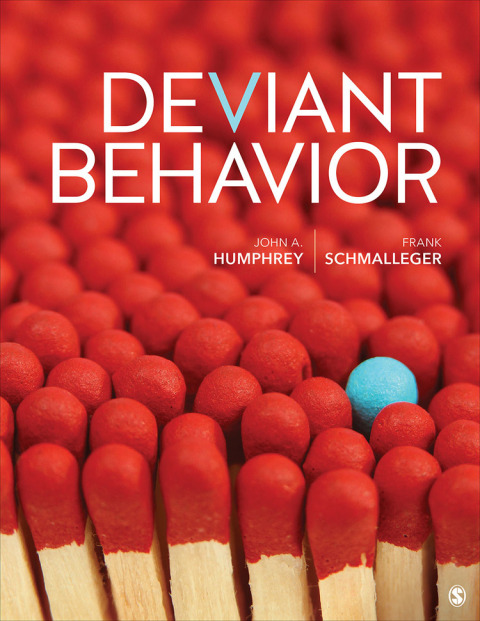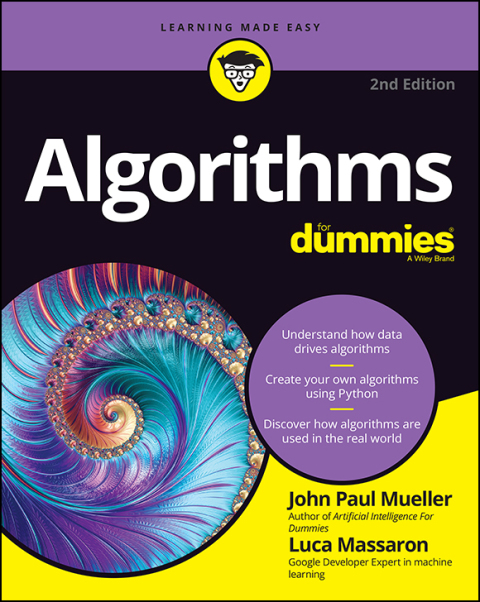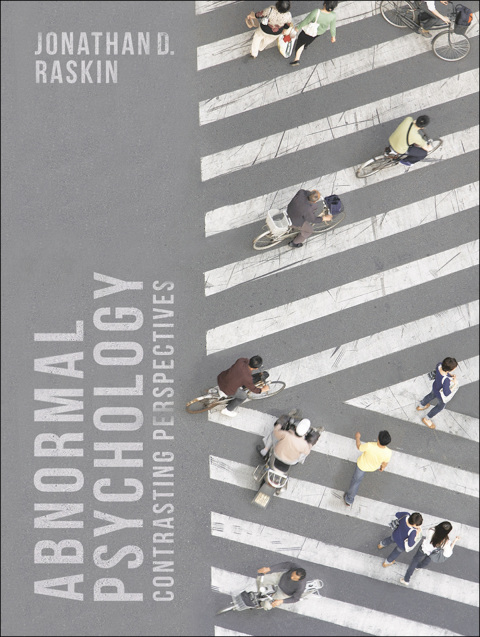Description
Efnisyfirlit
- Preface
- Acknowledgments
- About the Authors
- CHAPTER 1 • Introduction to the Study of Deviant Behavior
- Introduction
- Defining Deviant Behavior
- PORTRAITS OF DEVIANCE: Expectational Norms
- The Situational Perspective and Societal Reaction
- Issues in the Study of Deviant Behavior
- Dimensions of Deviance
- Patterned Versus Idiosyncratic
- Positive Versus Negative
- Innovative Versus Routine
- Individual Versus Group Deviance
- Episodic Versus Chronic Deviance
- Functions of Deviant Behavior
- Other Functions of Deviant Behavior
- Globalization and Deviant Behavior
- DEVIANCE IN THE DIGITAL WORLD: Facebook
- The Theme of This Book
- A Conceptual Framework for the Study of Deviance
- Book Overview
- DEVIANCE IN GLOBAL CONTEXT: Deviant Globalization
- Special Features
- Organization
- Chapter Summary
- Key Concepts
- Critical Thinking Questions
- CHAPTER 2 • Theories of Deviant Behavior: I Classical Theories
- Introduction
- Evidence-Based Behavior Analysis
- What Is a Theory?
- Criteria for Evaluating a Theory
- The Classical School
- Recent Advances in Classical Thought: Neoclassical Thought
- Societal Reaction/Labeling Perspective
- PORTRAITS OF DEVIANCE: Juvenile Court and Tagging
- Social Control Theory
- DEVIANCE IN GLOBAL CONTEXT: The General Theory of Crime Across the Globe
- New Theoretical Approaches
- DEVIANCE IN THE DIGITAL WORLD: Social Media “Stars”
- Chapter Summary
- Key Names
- Key Concepts
- Critical Thinking Questions
- CHAPTER 3 • Theories of Deviant Behavior: II Contemporary Perspectives
- Introduction
- The Conflict Perspective
- Social Structure and Conflict
- DEVIANCE IN THE DIGITAL WORLD: Heckling a Drowning Man
- Feminism
- The Functionalist Perspective
- Social Integration
- Chicago School: Social Disorganization
- PORTRAITS OF DEVIANCE: Elijah Anderson: Code of the Street
- Differential Association/Social Learning
- Sutherland’s Nine Propositions of Differential Association
- DEVIANCE IN GLOBAL CONTEXT: Social Learning, Reinforcement, and Crime Across Europe
- Ronald Akers’s Social Learning Approach to Deviance
- Chapter Summary
- Key Names
- Key Concepts
- Critical Thinking Questions
- CHAPTER 4 • Homicide
- Introduction
- Types and Definitions of Homicide, Assault, and Battery
- Definitions of Assault and Battery
- Global Patterns of Homicide
- Gun-Related Homicide
- DEVIANCE IN GLOBAL CONTEXT: Homicide and Assault
- Patterns and Trends in Criminal Homicide in the United States
- Homicide Rates Across the United States
- Homicide Rates by Size of Place
- Age, Gender, and Race Patterns of Homicide in the United States
- Age
- Gender
- Race
- Age, Gender, and Race
- Homicide Victim–Offender Relationships
- Early Childhood
- AT A GLANCE: Patterns and Trends in Homicide
- Middle Childhood
- The Adolescent Years
- Juvenile Offenders
- Assault and Battery of Children
- Theories of Criminal Homicide and Assaultive Behavior
- DEVIANCE IN THE DIGITAL WORLD: WorldStarHipHop
- Social Integration
- Social Disorganization
- Routine Activities
- Strain
- Frustration–Aggression
- Unreciprocity
- Social Control
- Subcultural Considerations
- PORTRAITS OF DEVIANCE: Homicide as a Situated Transaction
- Victim-Precipitated Homicide
- Chapter Summary
- Key Concepts
- Critical Thinking Questions
- CHAPTER 5 • Domestic Violence
- Introduction
- Legal Definitions
- Social Definitions
- Extent and Nature of Domestic Violence
- Intimate Partner Violence
- Costs and Consequences of Domestic/Intimate Partner Violence
- Psychological and Behavioral Health Consequences
- Child Maltreatment
- Elder Abuse
- LGBT Abuse
- AT A GLANCE: Domestic/Intimate Partner Violence
- Risk Factors for Domestic Violence
- Why Do They Stay?
- PORTRAITS OF DEVIANCE: Women Lift the Veil on Abuse
- Cycle of Violence
- DEVIANCE IN THE DIGITAL WORLD: Tinder
- Corporal Punishment
- Theories of Domestic Violence
- Exchange/Social Control Model
- Power and Dominance
- Feminist Theory
- DEVIANCE IN GLOBAL CONTEXT: Globalization, Islam, and the Risk of Domestic Violence: The Case of the Maldives
- Subculture of Violence
- Routine Activities
- Strain
- Frustration–Aggression
- Unreciprocity
- Self-Control
- Social Learning Theory
- Chapter Summary
- Key Concepts
- Critical Thinking Questions
- CHAPTER 6 • Suicide and Life-Threatening Behaviors
- Introduction
- Medical/Legal Definitions of Suicide
- Suicide Around the World and in the United States
- Rate of Suicide in the United States
- DEVIANCE IN GLOBAL CONTEXT: Suicide in the People’s Republic of China
- Regional Differences in the United States
- Age, Gender, and Race
- Patterns of Suicide
- Women
- Indigenous Americans
- Elderly
- Youth
- PORTRAITS OF DEVIANCE: Suicide
- Precipitants of Suicide
- Social Structural Positioning
- Life Circumstances
- DEVIANCE IN THE DIGITAL WORLD: 13 Reasons Why
- Attempted Suicide
- Mental Illness and Suicide
- Risks for Suicide
- Clues to Suicide
- The Suicide Process
- The Contagion of Suicide
- AT A GLANCE: Trends and Patterns in Suicide
- Special Topics
- Suicide Notes
- Homicide Followed by Suicide
- Assisted Suicide
- Suicide by Cop
- PORTRAITS OF DEVIANCE: Suicide by Cop
- Theories of Suicide
- Explanations of Suicide Rates
- Explanations of Individual Suicidal Behavior
- Chapter Summary
- Key Concepts
- Critical Thinking Questions
- CHAPTER 7 • Mental Illness
- Introduction
- Nature of Mental Illness
- Cultural Definitions
- Social Definitions
- PORTRAITS OF DEVIANCE: Political Dissent and Psychiatric Hospitalization
- Medical Definition
- DEVIANCE IN THE DIGITAL WORLD: Snapchat
- AT A GLANCE: Patterns of Mental Illness
- The Epidemiology and Costs of Mental Illness
- DEVIANCE IN GLOBAL CONTEXT: Globalization and Mental Illness
- Costs of Mental Illness
- Prevalence of Mental Disorders in the United States
- Sociodemographic Variations in Prevalence
- Sociodemographic Variations in the Prevalence of Mental Disorders
- iPhone Use and Mental Health
- Family Experience, Inherited Vulnerabilities, and Stressful Life Events
- Social Causation Versus Social Selection
- Labeling, Societal Reaction, and Social Roles
- PORTRAITS OF DEVIANCE: Being Sane in Insane Places
- Theoretical Explanations of Mental Illness
- Integration Theories
- Social Disorganization and Anomie
- Conflict
- Chapter Summary
- Key Concepts
- Critical Thinking Questions
- CHAPTER 8 • Alcohol Abuse
- Introduction
- Definitions
- DSM-5 Criteria for Alcohol Use Disorder
- Alcohol Use Around the World
- PORTRAITS OF DEVIANCE: Alcoholism as a Disease
- Substance Use in the United States
- Culture and Alcohol Use
- AT A GLANCE: Patterns and Trends in Alcohol Use
- DEVIANCE IN GLOBAL CONTEXT: Globalization, Cultural Orientation, and Alcohol Use by University Students in China
- Religion, Spirituality, and Substance Use
- Special Issues
- Onset of Alcohol Use
- Underage Drinking
- College Students
- DEVIANCE IN THE DIGITAL WORLD: Twitter
- Indigenous Americans
- Explanations of Alcohol Abuse
- Rates of Alcohol Abuse
- Individual Alcohol Abuse
- Chapter Summary
- Key Concepts
- Critical Thinking Questions
- CHAPTER 9 • Illicit Drug Use
- Introduction
- Definitions
- Illicit Drug Use Around the World
- Illicit Drug Use in the United States
- AT A GLANCE: Global Patterns in Drug Use
- DEVIANCE IN GLOBAL CONTEXT: Social Media and Nonprescription Drug Use
- Race and Ethnicity
- Marginal Populations
- LGBT Community
- Indigenous Americans and Native Alaskans
- PORTRAITS OF DEVIANCE: Adderall and College Students
- College Students
- Explanations for Illicit Drug Dependence
- Opportunity Structures
- Social Integration
- Social Conflict
- Self-Derogation
- Social Strain
- Cognitive Association, Euphoria, and the Seduction of Substance Use
- Social Learning
- Self-Control
- Chapter Summary
- Key Concepts
- Critical Thinking Questions
- CHAPTER 10 • Sexual Offending
- Introduction
- Definitions of Criminal Sexual Offending
- Rape
- Sexual Assault
- Nonviolent Sexual Offenses
- Sexual Offenses Against Children
- Prostitution
- PORTRAITS OF DEVIANCE: Prostitutes, Pimps, and Violence
- Sexual Trafficking of Women and Children
- DEVIANCE IN GLOBAL CONTEXT: Pimps, Immigrants, and Prostitution in the United States
- Rates of Criminal Sexual Offending
- Sexual Offending in the United States
- Characteristics of Criminal Sexual Offending
- Victim Characteristics
- Offender Characteristics
- Social and Situational Characteristics of Sexual Offenses
- AT A GLANCE: Patterns in Sexual Offending
- Typology of Rapists
- College Students
- Internet Sex Offenders
- Prostitution
- Extent of Prostitution
- DEVIANCE IN THE DIGITAL WORLD: Inmates, Sextorting, and Military Personnel
- Typology of Prostitution
- Street Life, Drugs, and Prostitution
- Online Sexual Solicitation and Child Pornography
- Social Media and Sextortion of Minors
- Consequences of Childhood Sexual Victimization
- Sexual Revictimization
- Explanations for Criminal Sexual Offending
- Theoretical Explanations
- Explaining Rates of Criminal Sexual Offending
- Individual Level Explanations of Criminal Sexual Offending
- Chapter Summary
- Key Concepts
- Critical Thinking Questions
- CHAPTER 11 • Property Crimes
- Introduction
- Statutory Definitions
- Rates in the United States
- Larceny
- Burglary
- Robbery
- Property Crimes Around the World
- Victims of Property Crimes
- Costs of Property Crime
- Victim–Offender Relationship
- DEVIANCE IN GLOBAL CONTEXT: Global Trafficking in Stolen Art
- Criminal Decision Making
- Planning
- Target Selection
- AT A GLANCE: Property Crimes: Global Patterns and Trends
- Types of Thieves
- Professional, Persistent, and Occasional Thieves
- Robbers
- Burglars
- Car Thieves
- Shoplifters
- DEVIANCE IN THE DIGITAL WORLD: eBay
- Theoretical Explanations
- Explanations of Rates of Property Crime
- Explanations of Individual Property Crime
- Chapter Summary
- Key Concepts
- Critical Thinking Questions
- CHAPTER 12 • White-Collar and Organized Crime
- Introduction
- White-Collar, Corporate, and Government Crime
- Definitions and Forms of White-Collar Crime
- DEVIANCE IN THE DIGITAL WORLD: Tumblr
- Extent of White-Collar Crime
- PORTRAITS OF DEVIANCE: The Surge of White-Collar Crime
- Extent of Organized Crime
- AT A GLANCE: White-Collar and Organized Criminal Offending
- Organized Crime Groups
- DEVIANCE IN GLOBAL CONTEXT: Transnational Organized Crime
- Theoretical Explanations
- Explanations of Rates of White-Collar and Organized Crime
- Explanations of an Individual’s Involvement in White-Collar and Organized Crime
- Chapter Summary
- Key Concepts
- Critical Thinking Questions
- CHAPTER 13 • Cyberdeviance
- Introduction
- Types of Computer Crimes
- Extent and Patterns of Cybercrime
- Cybercrime Around the World
- Computers as the Target
- Computers as Instruments of Crime
- Computers as Incidental to Other Crimes
- Crimes Associated With the Prevalence of Computers
- Methods of Cyberdeviance
- Trap Doors
- Timing Attacks
- Trojan Horses
- Viruses
- Worms
- Logic Bombs
- Salamis
- PORTRAITS OF DEVIANCE: Social Media, Deep Fakes, and Truth Decay
- Typology of Cyberdeviants
- Hackers
- Crackers
- AT A GLANCE: The Costs of Cybercrime
- DEVIANCE IN GLOBAL CONTEXT: Russia’s Hacking Culture
- Cyberdeviant Subculture
- Technology Content
- Secrecy and Fluidity
- DEVIANCE IN THE DIGITAL WORLD: YouTube
- Gender Gap and Antipathy
- Ethics and the Cyberdeviant
- Cyberdeviance Motivation
- Sexting: Internet Crime, Deviance, or Neither?
- Theories of Cyberdeviance
- Seduction of Crime
- Social Learning, Differential Reinforcement, and Differential Association
- Rational Choice
- Techniques of Neutralization
- Social Control
- Anomie
- Chapter Summary
- Key Concepts
- Critical Thinking Questions
- CHAPTER 14 • Positive Deviance
- Introduction
- Positive Deviance Defined
- Functions
- Creative Process
- Discovery Processes
- PORTRAITS OF DEVIANCE: Albert Einstein’s Enduring Creativity
- Characteristics of Positive Deviants
- DEVIANCE IN GLOBAL CONTEXT: Nobel Prize Winners Across the World
- Social Characteristics of Discoverers and Creative Persons
- Explanations of Positive Deviance
- Opportunity Theory
- Social Integration
- Conflict
- Societal Reaction
- Chapter Summary
- Key Concepts
- Critical Thinking Questions
- CHAPTER 15 • Extreme Forms of Everyday Behaviors: Working, Using the Internet, and Exercising
- Introduction
- Extreme Forms of Everyday Behavior
- Nature of Overwork
- Workaholics and Workaholism
- Extreme Jobs
- Characteristics of Workaholics
- DEVIANCE IN GLOBAL CONTEXT: South Koreans Escape to Prison
- DEVIANCE IN THE DIGITAL WORLD: Omegle
- Socialization and Psychological Factors in Overwork
- Consequences of Overwork
- Computer and Internet Addiction
- Types of Internet Addiction
- Prevalence of Computer Addiction
- Extreme Sports
- AT A GLANCE: Extreme Forms of Everyday Activity
- PORTRAITS OF DEVIANCE: Extreme Sports: In Search of Myself
- Theoretical Understandings of Extreme Forms of Everyday Behavior
- Social Integration
- Reciprocity
- Strain
- Differential Association and Learning Theory
- Rational Choice
- Societal Reaction
- Chapter Summary
- Key Concepts
- Critical Thinking Questions
- CHAPTER 16 • Terrorism
- Introduction
- What Is Terrorism?
- Terrorism and Crime
- Official Definitions of Terrorism
- International Terrorism
- Domestic Terrorism
- Hate Crimes
- Extent of Worldwide Terrorism
- PORTRAITS OF DEVIANCE: James Byrd—A Victim of Hate
- Typology of Terrorism
- AT A GLANCE: Terrorist Threats
- Terrorist Organizational Structure
- Terrorist Organizational Dynamics
- DEVIANCE IN GLOBAL CONTEXT: Social Media and Terrorism
- Suicide Bombers
- Recruitment
- New Suicide Bomber
- Terrorism: Psychopathology Versus Rational Behavior
- Motivations
- Doctrine of Necessity
- Cyberterrorism
- Definition
- Explanations for Terrorism
- Rational Choice
- Social Integration
- Routine Activities
- Culture Conflict
- Frustration–Aggression
- Strain
- Social Learning
- Techniques of Neutralization
- Chapter Summary
- Key Concepts
- Critical Thinking Questions
- Glossary
- References
- Index






Reviews
There are no reviews yet.